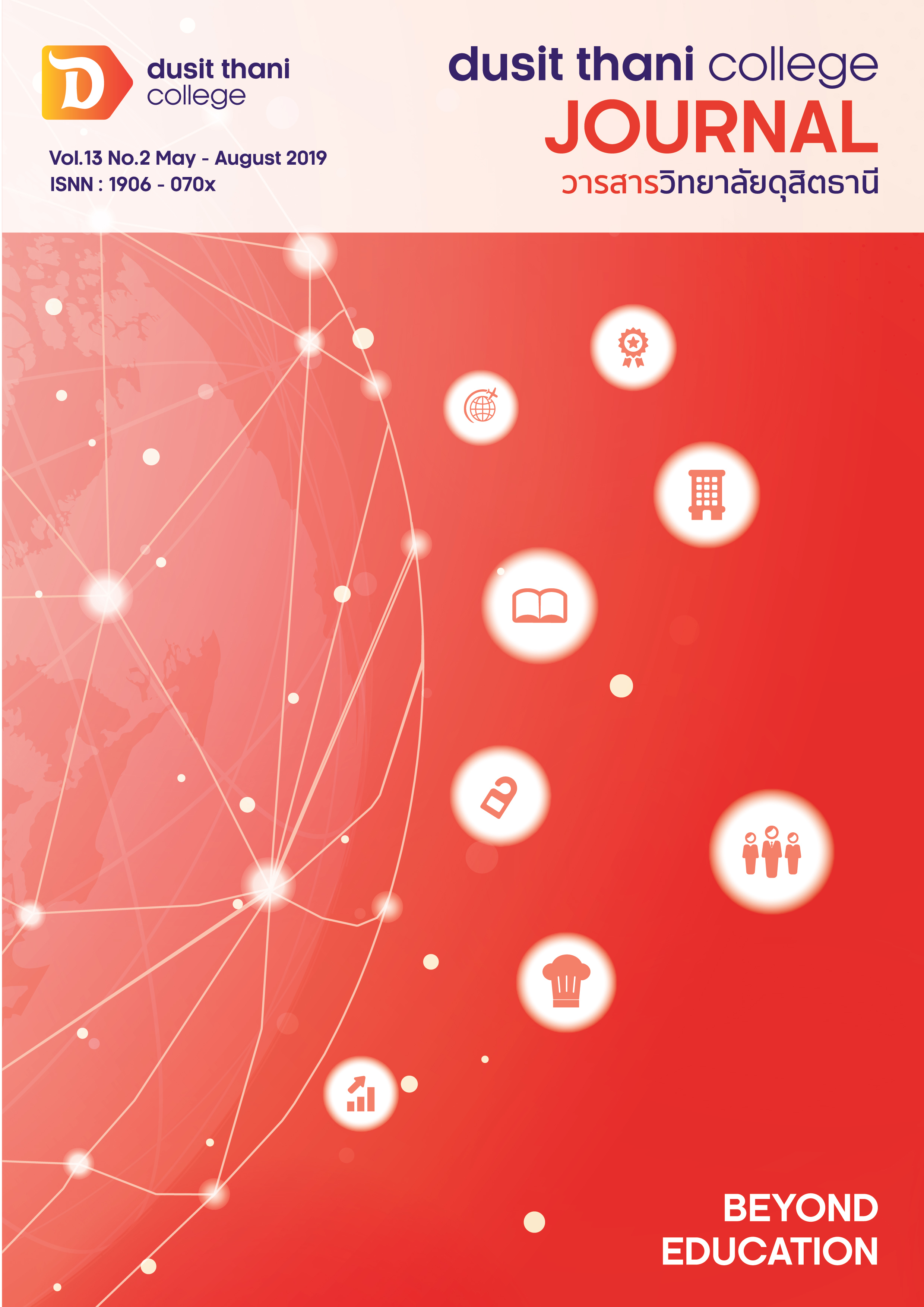Capabilities Development of Creative Tourism in Area of Thai Song Dam Ethnic Group, Khaoyoi District, Phetchaburi Province
Main Article Content
Abstract
The main purposes of this qualitative research aims to : (1) Survey tourism resources in area of Thai Song Dam ethnic group, Khaoyoi district, Phetchaburi province, (2) Assess capabilities of community management for creative tourism in area of Thai Song Dam ethnic group, (3) Propose development capacity guidelines for creative tourism in area of Thai Song Dam ethnic group. The research methods included 1) a group of focus group discussion 2) four groups of small group discussion 3) thirteenth purposively selected people in-depth interview 4) collecting data from documents and 5) an observation. The qualitative data; consisted of secondary information from related articles and researches, and primary data from collecting field data, was verified purposes by using data triangulation technique and content analysis respectively. The main findings of tourism resources in area of Thai Song Dam ethnic group were as follows; tourism destinations and attractions, accommodations, amenities, activities, and accessibility. The readiness of tourism resources and capabilities of management needed to be examined with an agreement. The community should be assisted the participations in any aspect of Tourism knowledge and understanding, and its advantages to encourage creative tourism in area of Thai Song Dam ethnic group. Capabilities of tourism enabled an increase with five factors; Creative Destination, Creative Entrepreneurs, Creative Locals, Creative Activities & Products, and Creative Communication.
Article Details
Article Screening Policy
- All research and academic articles to be published must be considered and screened by three peer reviews in the relevant field / article.
- All articles, texts, illustrations and tables published in the journal are the personal opinions of the authors. Editors don't always have to agree. And no responsibility whatsoever is the sole responsibility of the author.
- The articles to be published must never be published. Where did you first publish? And not in the consideration of other journals If the audit found that there has been a duplicate publication It is the sole responsibility of the author.
- Any article that the reader sees as being plagiarized or impersonated without reference. Or mislead the work of the author Please let the journal editor know it will be your greatest blessing.
References
2. Dech-Um, P., (2013). Development of Creative Tourism: National framework to implementation. Journals of Silpakorn University, Thai Edition, 33(2), 331-366, 2013.
3. Dhammavimutti, A., & Siriwong, P. (2017). Thai Song Dum’s Identities Conservation: Discourse practicioner to strengthen Community in case of Hua-KhaoJin community. Veridian E-Journal (Thai Edition) of Humanities, Social Science and Arts, 10(1), 1552-1571.
4. Gamklomchit, T., (2006). Song Nobleman. Phetphoom Publisher, pp 16-35.
Institute of Foreign Trade, Shanghai, China. Journal of Tourism Research. 8(1),
PP 27- 44, 20 February 2006.
5. Hearn, G. and Close, A. 1997. Defining generic professional competencies in Australia: toward a framework for professional development. Asia Pacific Journal of Human Resources. 34,3: 44-62.
6. Jirathamakul, R. (2016). The Development Guidelines of Creative Cultural Community – Based Tourism of Ban Ka-nan Community, Thalang District, Phuket Province.
Journal of Cultural Approach. 17(31), 3-17.
7. Keawnuch, K. (2017). Class Lecture papers; Creative Management on Culture Based Tourism. In. Bangkok: National Institute of Development Administration.
8. Keawsa-nga P. & Jumnongsri, N. (2012). Creative Tourism : A new choice of Thai Tourism. Suranaree Journal of Social Science, 5(1), 91-109.
9. McClelland, D.C. (1973). “Testing for Competence Rather than for Intelligence”.American Psychologist. 28(1) (March):1-14.
10. O’ Hagan, K. (1996). Competence in Social Work Practical Guide for Professional.London: Jessica Kinsley. Journal of Tourism Research, 28(2): 269–290.
11. Parnkasem, T. (2016). Participatory Communication for Promoting Creative Tourism in NAN. Journal of communication and management, NIDA, 155-176.
12. Pisanbut, P., Kongklai, J. & Kittisaknawin, C., (2016). Guidline to develop Human resources competency in organization. Veridian E-Journal (Thai Edition) of Humanities, Social Science and Arts, 9(1), 1315 –1326.
13. Pongsri, V & Thongchai, S. (2007). Creating integrated tourism models in Khong Chiam District. Ubon Ratchathani Province. Environment and natural resource journal, 5(2), 164-172.
14. Prabpairi, M. (2000). Community empowerment in tourism management: Cased of Thai Song Dam, Kao Yoi, Phetchaburi (Master of Arts), Chiangmai University, Chiangmai.
15. Ratsami-dhammachot, S. (2006). Guideline to development of human potential with Competency Based Learning. Bangkok: Siriwattana Inter-Printing.
16. Richards, G. (2010). Creative Tourism and Local Development.In Wurzburger, R. (Ed.).
17. Shermon, Ganesh. (2004). Competency Based HRM: A Strategic Resource for Competency Mapping, Assessment and Development Centres. New Deli: Tata McGraw-Hill.
18. Shinnachot, P. & Juntuk, T. (2016). Model of SaunPhuang’s creative tourism management. Veridian E-Journal (Thai Edition) of Humanities, Social Science and Arts, 9(1), 250-268.
19. Shunli Gao, Songshan Huang and Yucheng Huang. (2009). Rural Tourism Development in China. The Coordination Department, China National Tourism Administration,
20. Srimarksuk, K. (2015). Factor analysis of existences and changes in Thai Song Dam’s ritual and ceremony: Cased of NongProng, Kaoyoi, Phetchaburi. (Doctor of Philosophy Thai Studies Dissertation), Burapha University, Chonburi.
21. Sukkhi, S. (2010). Community participation; Ecotourism; Floating market; Damnoen Saduak Floating market; Ratchaburi. (Master Degree Dissertation), Naresuan University, Phitsanulok.
22. Suttipisan, S. (2013). Adaptive Uses of Local Textiles for Creative Tourism Product Developmentin Thailand. International Journal of Cultural and Tourism Research, 6(1), 47-55.
23. Thammasat University. (2012). Creative Tourism model Project. Faculty of Sociology and Anthropology, Thammasat University.
24. Tongkeaw, K. (2017). Potential of Thai Song Dams’ community in Chumporn. Journal of InthaninThaksinSara, 12(special), 9-31.
25. Williams J, Lawson R. (2001). Community issues and resident opinions of tourism. Annals
26. Wisoothirak, S., Saiphan, P., Tephalakul, O. & Sindecharak, T. (2013).Creative Tourism. Bangkok:Designated Areas for Sustainable Tourism Administration (Public Organization) Faculty of Sociology and Anthropology, Thammasat University.


